There are various types of testing related to COVID-19, including molecular diagnostic, antibody and antigen testing. The first tests developed were molecular diagnostic tests using a respiratory specimen (most commonly a long Q-tip inserted into the nose). Antigen testing also uses a respiratory specimen but can diagnose this disorder faster and with less expense, but it is not as sensitive as molecular testing. The goal of both tests is to provide a diagnosis of active infection. Now, let’s talk about antibody testing: its purpose, how it is performed and its importance.
Antibody testing is also known as serology testing. It is used to detect an exposure that the body has made antibodies to. It is recommended to wait to get tested until at least two weeks after symptoms of COVID-19 or if you were in close contact with someone who has tested positive for COVID-19. There are currently three types of antibody testing: IgG, IgM and IgA. These are being tested individually and in panels, and show us different stages of the infection. Antibody testing is different from molecular diagnostic testing or antigen testing in that the latter tests are confirming an active presence of the virus. In contrast, antibody testing is not diagnostic but to see if you have been exposed to the virus, symptomatic or not. 
How is antibody testing performed? The Food and Drug Administration (FDA) first approved antibody testing on April 28, 2020 and has approved multiple antibody tests with their Emergency Use Authorization (EUA). A blood sample is used, via venipuncture or a pinprick, with results coming back in a few hours to a few days. LOINC currently has 18 serology tests listed on their prerelease page (subject to change prior to inclusion in a public release) with a release date of June 2020.
Why is antibody testing important? It can be used for primary surveillance and epidemiology studies. We will be able to see what the true rate of occurrence is with a more accurate mortality rate. Since it can identify people who have had COVID-19 and developed the antibodies to it, plasma can be used from this group for convalescent therapies (currently being explored), thus aiding in treatment research. It is presently unknown how accurate antibody testing is; it is also not yet confirmed that the antibodies would provide us with a definitive future immunity to COVID-19. In the meantime, it will be important to continue social distancing and wearing face masks as appropriate, per Center for Disease Control and Prevention (CDC) recommendations.
To wrap up, here are examples of the three types of COVID-19 tests from LOINC:
- Molecular diagnostic testing: 94758-0 SARS-VoV-2 E gene presence in respiratory specimen by NAA with probe detection
- Antigen testing: 94558-4 SARS2-CoV-2 antigen in respiratory specimen by rapid immunoassay
- Antibody testing: 94762-2 SARS-CoV-2 antibody presence in serum or plasma by immunoassay
Currently, we are offering free COVID-19 value sets to aid in surveillance and research. The COVID-19 lab test value set collects all laboratory related codes including the antibody tests from LOINC, in addition to molecular diagnostic and antigen tests. Please contact us if you have other terminology topics that you’d like us to discuss, or need help with terminology implementation or mapping.

